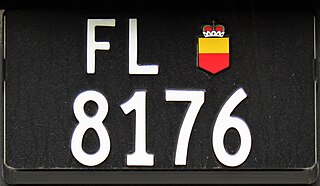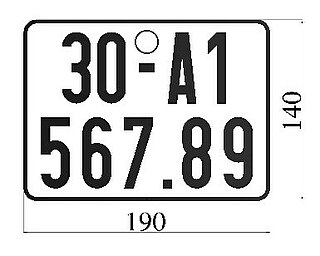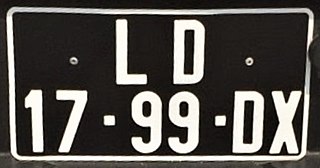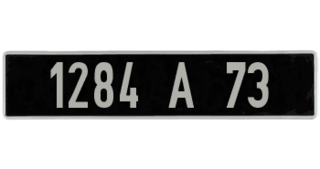
The country in which a motor vehicle's vehicle registration plate was issued may be indicated by an international vehicle registration code, also called Vehicle Registration Identification code or VRI code, formerly known as an International Registration Letter or International Circulation Mark. It is referred to as the Distinguishing sign of the State of registration in the Geneva Convention on Road Traffic of 1949 and the Vienna Convention on Road Traffic of 1968.

Vehicle registration plates in the Philippines, commonly known as license plates, are issued and regulated by the Land Transportation Office (LTO), a government agency under the Department of Transportation (DOTr).

Vehicle registration plates are mandatory number plates used to display the registration mark of a vehicle registered in France. They have existed in the country since 1901. It is compulsory for most motor vehicles used on public roads to display them.

North Korea has issued registration plates for all government and privately owned vehicles since 1947. The system is loosely based on that found in Japan insofar as numerical prefixes are applied to denote a particular type or class of vehicle.
In the United States, the appearance of license plates is frequently chosen to contain symbols, colors, or slogans associated with the issuing jurisdiction, which are the 50 U.S. states, the District of Columbia, the five inhabited U.S. territories, and Native American tribes, each of which independently registers motor vehicles. Regular-issue license plates for passenger vehicles typically have six or seven characters, with vanity plates having up to eight characters in a few states.
The U.S. state of Illinois first required its residents to register their motor vehicles in 1907. Registrants provided their own license plates for display until 1911, when the state began to issue plates. As of 2023, plates are issued by the Illinois Secretary of State.

Vehicle registration plates of the Principality of Liechtenstein are composed of the letters FL, followed by the small version of the coat of arms of Liechtenstein and up to five digits. The letters FL stand for Fürstentum Liechtenstein. Standard license plates show white characters on a black background, using the same type of font as Swiss license plates.

Vehicle registration plates of Vietnam generally take the form DDL-DDDDD for vehicles. Standard license plates have black characters on white background. Front plates measure 47 × 11 cm, rear ones are 27 × 20. In 2020 and 2021, both plates measure 6 x 12. The current scheme for civilian vehicles omits the letters I, J, O, Q and W, with the letter R reserved for trailers, and includes the Vietnamese D.

While Saint Pierre and Miquelon no longer has any functioning railways, today it has 114 km (71 mi) of highways plus 45 km (28 mi) of unpaved roads. Its only major harbour is at Saint-Pierre although there is a smaller harbour at Miquelon. The dependency has no merchant marine but has two airports; the runway at Saint-Pierre Airport is 1,800 metres (5,910 ft) long, and at Miquelon Airport, 1,000 metres (3,280 ft).
The license plates of Mauritania feature a white background with a blue label. The plates start with four digits, followed by two letters, and end with a two-digit number. This combination provides information about the specific area where the vehicle is registered. On the right side of the plate, there is a representation of Mauritanian license plates based on the Euro plate design. This includes a blue bar displaying a circular outline of the country and the distinctive "RIM" abbreviation in both Arabic and Latin letters. In older license plates, the blue bar is not present, and only the letters are displayed.
French Polynesia requires its residents to register their motor vehicles and display vehicle registration plates. Current plates are European standard 520 mm × 110 mm, and use French stamping dies. The overseas departments and territories of France have three-digit codes, starting with 97, which was originally the single code for them all.

Angola requires its residents to register their motor vehicles and display vehicle registration plates. Current plates are European standard 520 mm × 110 mm, and use Portuguese dies.

The Cook Islands requires its residents to register their motor vehicles and display vehicle registration plates. Current plates are Australian standard 372 mm × 134 mm, and use Australian and New Zealand stamping dies, as zeroes now have a slash through them.

The Comoros requires its residents to register their motor vehicles and display vehicle registration plates. The current plates are European standard 520 mm × 110 mm, and use French stamping dies.

Grenada requires its residents to register their motor vehicles and display vehicle registration plates. Current plates are North American standard 6 × 12 inches but use Mandatory typeface developed for use on British plates. There are also some examples of plates using the size of standard British plates. Rear plates have yellow background and front ones white.

Panama requires its residents to register their motor vehicles and display vehicle registration plates. Current plates are North American standard 12 × 6 inches.

Dominica requires its residents to register their motor vehicles and display vehicle registration plates. Current plates are North American standard 6 × 12 inches. Vehicles have black on white plates or black on white (front) and black on yellow (rear) plates. The first letter of the license plate identifies the type of vehicle it is. P identifies Private Vehicle.
Saint Vincent and the Grenadines requires its residents to register their motor vehicles and display vehicle registration plates. Current plates are European standard 520 mm × 110 mm, and plates are white or silver on black, or black on reflective white (front) and black on reflective yellow (rear) in the British style, are owner provided and come in different styles.
Curaçao requires its residents to register their motor vehicles and display vehicle registration plates.

The former U.S. territory of the Canal Zone first issued license plates in 1910, and this continued until the Canal Zone was returned to Panama in 1979. A single plate was issued for all years. The country of Panama also issued Canal Zone license plates for United States citizens that lived in Panama but worked in the Canal Zone, but these plates have the country name "Panama" clearly showing on them. Since reciprocity for license plates between the Canal Zone and Panama did not exist until 1950, old photos often show local vehicles with two different license plates mounted on the vehicle.





















